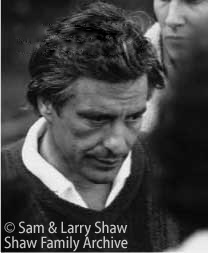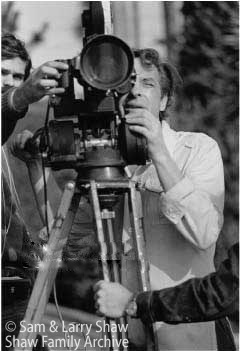|
Glimpses
of Cassavetes' Soul
Click
here for best printing of text
Interviewer:
Can you talk about Cassavetes' acting in other directors' works? Which
of his performances are worth viewing?
Carney: I'm
glad you asked that question because even with the revival of interest
in Cassavetes as a director, most of his best acting performances are
still unknown. I've presented a lot of these works at film festivals and
discovered that even programmers and festival curators are unfamiliar
with most of the things Cassavetes' acted in.
Everybody knows
about The Dirty Dozen and Rosemary's Baby, of course. In
fact, if you say Cassavetes' name to the man on the street, those are
the two films that people generally associate with him. They are much
better known than the movies he directed. When I lecture at film festivals
about Cassavetes' work as a director, I usually get a question or two
at the end asking about one or the other from people who think he directed
them. Then when I correct them and say he didn't direct those movies but
wrote and directed The Killing of a Chinese Bookie, Opening Night,
and Love Streams, the same people say they never heard of any of
them!
 Interviewer:
Can you give us your personal list of Cassavetes' greatest acting performances? Interviewer:
Can you give us your personal list of Cassavetes' greatest acting performances?
Carney: I'll
give you a guided tour of the best work Cassavetes ever did as an actor.
Ray Carney's Viewing Guide to Cassavetes the Actor. When I screen
the films at a festival, I call the event “The Unknown John Cassavetes.” Interviewer:
What do you show?
Carney: It
depends on how many days I have for the events and how serious the festival
is about doing it. I could start with the Polanski and Aldrich movies,
since they are both pretty good pieces of acting, but to tell you the
truth, I usually skip them since most people have already seen them and
I'd rather shown them things people can't see anywhere else. I also skip
a lot of the other well-known big budget Hollywood films for the opposite
reason. They are either pretty awful or Cassavetes' performances in them
are not very interesting. That leaves out Two-Minute Warning, Whose
Life is it Anyway?, The Incubus, Devil's Angels, The Killers, and
a few other things. Not really worth the time and trouble to include.
Paul Mazursky's Tempest has a few good moments, particularly the
party in the New York apartment when Cassavetes' character comes in drunk
and does his version of the Mabel Longhetti part in A Woman Under the
Influence. But it's a pretty bloated over-written movie, and could
be also left off of the list if you were pressed for time.
So, with a
bunch of works in the “skip them” category, and The Dirty
Dozen, Rosemary's Baby, and Tempest in the “optional”
category, that brings me down to the “must screen” category.
The great unknown masterworks of Cassavetes' acting career. Are you ready?
I forgot my trumpet or I'd play you a little fanfare.
There are
three
“must see” works on film. One astonishing. One very good. And
one just plain fun. To find out Ray Carney's recommendations,
buy the packet this interview appears in. To find out Ray Carney's
recommendations, buy the packet this interview appears in. To find
out Ray Carney's recommendations, buy the packet this interview appears
in. To find
out Ray Carney's recommendations, buy the packet this interview appears
in. To find out Ray Carney's recommendations,
buy the packet this interview appears in. It's really pretty slight,
not on the level
of either of the other two works, but it's a charmer. Very sweet and
gentle. As an actor with very few lines, Cassavetes shows how much you
can do
with a little.
If you wanted
to round out the film series, not to leave any of his greatest performances
out, you'd also have to include two of his own works: Husbands
and Love Streams.
 Interviewer:
What about Opening Night and Minnie and Moskowitz? Interviewer:
What about Opening Night and Minnie and Moskowitz?
Carney: You
could include them, he does good work in both, but I'm not sure that they
belong in this kind of series since he only has a tiny part in the one
film [Minnie and Moskowitz] and a supporting role in the other
[Opening Night]. In Mikey and Nicky, Marvin and Tige,
Husbands, and Love Streams, on the other hand, he turns in
complex, extended performances. He really spreads his wings and flies,
constructing complex characters with a lot of different colors to them
and working through some major changes and beat shifts. They are real
symphonies of tones and moods.
On top of
everything else, Mikey and Nicky, Marvin and Tige, Husbands,
and Love
Streams give you a really deep view of Cassavetes' personality. He's
more or less playing characters in Minnie and Moskowitz and Opening
Night. But he's revealing things about himself in the other ones – his
manic con man bullshit hustler side in Mikey and Nicky; his
charm-the-pants-off-you side in Husbands; the lonely lone
wolf side of him in Love Streams;
and the quiet introspective sad withdrawn side of him in Marvin and
Tige. Weston's film has a real autobiographical rawness. Cassavetes
decided to play a dying alcoholic at precisely the point at which he
discovered
he was dying from alcoholism. That's got to make for an interesting performance.
And it does.
Interviewer:
So those are the works you show in your “Unknown Cassavetes”
event?
Carney: Well
as I said it depends on what I am allowed to do. I've never been allowed
to show all of these works at one film festival. But that's my dream team.
Those are the films I'd like to show.
And I've only
named the works on film. There are television works that are even less
well known than the movies are. In fact, I may be the only person on the
planet who has seen some of them! And they are almost as good as the best
films. Do you want to hear about them?
Interviewer:
Sure.
Carney: OK.
The first thing to keep in mind is that the Golden Age of Television is
a myth. TV shows in the fifties, sixties, and seventies were generally
just as dreadful as what is on TV today. So there are a lot of Cassavetes
performances out there that you want to avoid. Bad old Alfred Hitchcocks.
Bad old Johnny Staccatos. That's the bad news. But the good is
that there are five or six really great dramatic pieces that are worth
screening. They are completely unknown and unavailable now, and it took
me years to locate them. but since they are on video and relatively portable,
they're easy to show and I've shown many of them at special events and
film festivals. They all go over really really well with audiences.
Interviewer:
Can you name a few?
Carney: Sure.
I'd put a television show called To find out Ray
Carney's recommendations, buy the packet this interview appears in. To find out Ray
Carney's recommendations, buy the packet this interview appears in.
To
find out Ray Carney's recommendations, buy the packet this interview
appears in. To find out Ray Carney's recommendations,
buy the packet this interview appears in. To find out Ray Carney's recommendations,
buy the packet this interview appears in. To find out Ray Carney's recommendations,
buy the packet this interviewso he could get make some money to pay
for Woman Under the Influence.
And, as with
the movies, if you know how to watch and where to look in each of them,
you get glimpses of Cassavetes' soul.
Interviewer:
What do you mean by that?
Carney: As
I said about the film roles, Cassavetes' strongest acting performances
on television as well are always more or less direct emanations of his
personality. What Polanski once said about him as a criticism was true
as a compliment: He was terrible at playing characters but terrific at
playing himself. That's true of all of his best acting work, both in film
and television. Fortunately he had a very interesting self to play. So
seeing these old pieces is a rare chance to try to get inside the heart
and mind of the man who made those strange strange movies.
Interviewer:
Is that everything you show?
Carney: No.
As Frank said, the best is yet to come. Or at least the work the most
revealing of Cassavetes personally. Though it might be a question of where
you want to draw the line, dramatically speaking.
If I am allowed
to, in my “Unknown Cassavetes” event I always try to show
some nondramatic pieces. You know, talk show appearances and interview
pieces.
Because of Cassavetes' personality, these are some of the most interesting
things he ever did. He was like Robin Williams or Richard Pryor that
way – more
interesting without a script than with one. The scripts were never as
exciting as his improvisations. There is not a dull moment in any
of the
interview footage. And you get a real insight into Cassavetes the man – the
Krazy Kat wild man con man.
Interviewer:
What do you show?
Carney: Oh,
lots of different things. I have more than I can ever show at any one
event. I have a tape of Cassavetes cavorting around on Dick Cavett
during the Husbands publicity blitz. He also did crazy routines
on the David Frost and Joey Bishop shows. And one time on
Johnny Carson.
I also love
to screen some of Tristram Powell's footage showing him writing and workshopping
Husbands. Working on scenes with Ben and Peter and the three young
ladies. And I have the stuff André Labarthe shot when he visited
Cassavetes while he was editing Faces. It's really great. And I
also have some marvelous footage of Cassavetes doing an interview in a
restaurant during the release of Opening Night that was shot but
never broadcast. He talks about why he makes movies.
Interviewer:
Where did you get all of these things?
Carney: Some
from John, but for the rest I have had to depend on the kindness of strangers.
Interviewer:
You say one of the interviews was never broadcast? How did you get it?
Carney: From
a collector who pulled it out of a dumpster when the TV studio that filmed
it was clearing out their vaults after an earthquake scare. [Laughing]
It's an ill fault line that does nobody good!
There's a lot
of wonderful material there. I'd put it on my web site if I had permission
and server capacity, but I don't. My eventual goal is to bring it all
out on a series of DVDs. But you'll have to stay tuned to see if that
happens.
This page
contains a short section from an interview with Ray Carney. The complete
interview covers many other topics. For more information about Ray Carney's
writing and interviews, including information about obtaining three different
packets of material in which he gives his views on film, criticism, teaching,
film festivals, the life of a writer, and the path of the artist, click
here.
|









